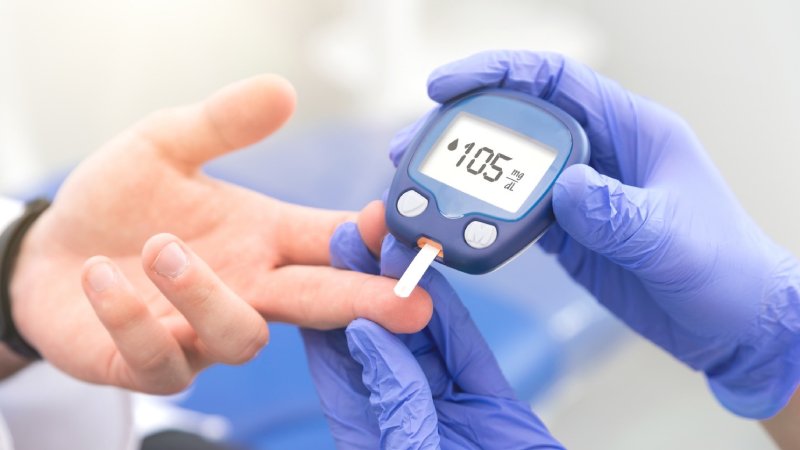Managing blood sugar levels is a daily challenge for people with diabetes, but it doesn’t have to be overwhelming. Small, simple changes can have a significant impact on your overall health. This article provides quick, actionable tips that you can easily incorporate into your daily routine to keep your blood sugar in check.
1. Start Your Day with a Balanced Breakfast
- Include Protein and Fiber: Begin your day with a breakfast that includes protein and fiber, such as eggs with whole-grain toast or oatmeal with nuts. This combination helps stabilize blood sugar levels and keeps you full longer.
- Avoid Sugary Cereals: Steer clear of sugary cereals and pastries, which can cause blood sugar spikes early in the day.
2. Stay Hydrated
- Drink Water Regularly: Staying hydrated is crucial for blood sugar control. Aim to drink plenty of water throughout the day to help your body manage glucose levels more effectively.
- Limit Sugary Drinks: Avoid sugary beverages like soda and fruit juices, which can cause rapid spikes in blood sugar. Opt for water, herbal teas, or sugar-free drinks instead.
3. Practice Portion Control
- Use Smaller Plates: Eating smaller portions can prevent overeating, which is important for maintaining stable blood sugar levels. Using smaller plates can help you control portion sizes without feeling deprived.
- Mind Your Carbs: Be mindful of your carbohydrate intake, as carbs have the most direct impact on blood sugar. Choose complex carbs like whole grains, vegetables, and legumes, and keep portion sizes moderate.
4. Incorporate Regular Physical Activity
- Take Short Walks: Even a 10-15 minute walk after meals can help lower blood sugar levels. Physical activity helps your muscles use glucose more effectively, which can prevent spikes.
- Find What You Enjoy: Whether it’s walking, dancing, swimming, or cycling, find an activity you enjoy and make it a regular part of your routine.
5. Monitor Your Blood Sugar Regularly
- Track Patterns: Regular blood sugar monitoring allows you to track patterns and understand how different foods, activities, and times of day affect your glucose levels.
- Stay on Top of Changes: Monitoring helps you make quick adjustments to your diet, exercise, or medication if you notice your blood sugar is consistently too high or low.
6. Make Smart Food Choices
- Choose Low-Glycemic Foods: Opt for foods that have a low glycemic index (GI), such as non-starchy vegetables, nuts, and lean proteins. These foods have a slower impact on blood sugar, helping you maintain more stable levels.
- Avoid Refined Sugars: Limit or avoid foods high in refined sugars, such as candy, baked goods, and sugary snacks, which can lead to rapid blood sugar spikes.
7. Manage Stress Effectively
- Practice Relaxation Techniques: Stress can cause blood sugar levels to rise, so managing stress is key. Incorporate relaxation techniques like deep breathing, meditation, or yoga into your daily routine to help keep stress levels in check.
- Stay Organized: Keeping a schedule and staying organized can reduce the stress that comes from managing diabetes on a daily basis.
8. Get Enough Sleep
- Prioritize Sleep: Aim for 7-8 hours of sleep each night, as poor sleep can negatively impact blood sugar levels. Create a relaxing bedtime routine to help ensure restful sleep.
- Avoid Late-Night Eating: Try to avoid eating large meals or snacks right before bed, as this can cause blood sugar levels to rise during the night.
9. Keep Healthy Snacks Handy
- Plan Ahead: Keep healthy, diabetes-friendly snacks like nuts, seeds, yogurt, or fruit on hand to help you avoid reaching for unhealthy options when hunger strikes.
- Balanced Snacking: When snacking, pair a source of protein with a complex carbohydrate to help stabilize blood sugar. For example, try an apple with peanut butter or a handful of almonds with a piece of cheese.
10. Stay Consistent with Medication
- Take Medication as Prescribed: Always take your diabetes medication or insulin as directed by your healthcare provider. Consistency is key to managing blood sugar levels effectively.
- Set Reminders: Use alarms or apps to remind you to take your medication at the right times, especially if your schedule is busy or varies day-to-day.
Conclusion
Keeping your blood sugar in check doesn’t have to be complicated. By incorporating these quick tips into your daily routine, you can make a big difference in your overall health and well-being. Remember, small steps can lead to significant improvements in your blood sugar management, helping you live a healthier and more balanced life with diabetes.

 Diabetology2 weeks ago
Diabetology2 weeks ago
 Diabetology1 week ago
Diabetology1 week ago
 Diabetology3 days ago
Diabetology3 days ago
 Diabetology2 days ago
Diabetology2 days ago
 Diabetology2 days ago
Diabetology2 days ago
 Diabetology1 day ago
Diabetology1 day ago









